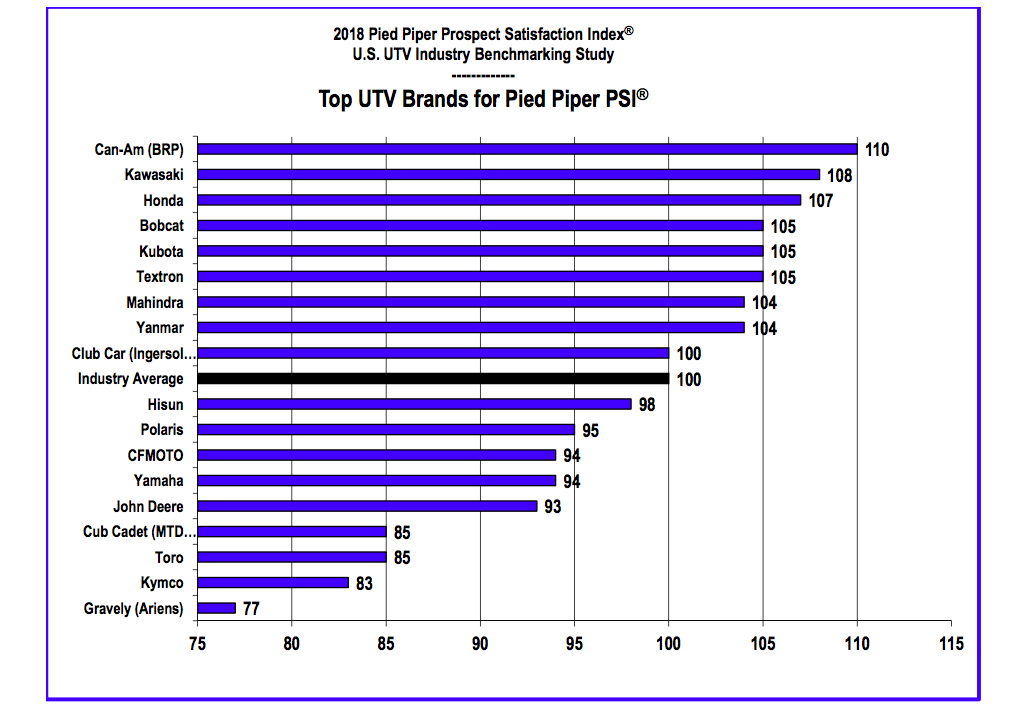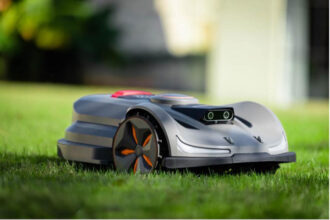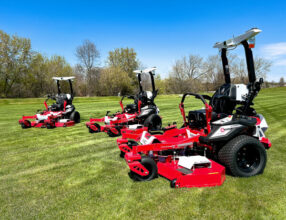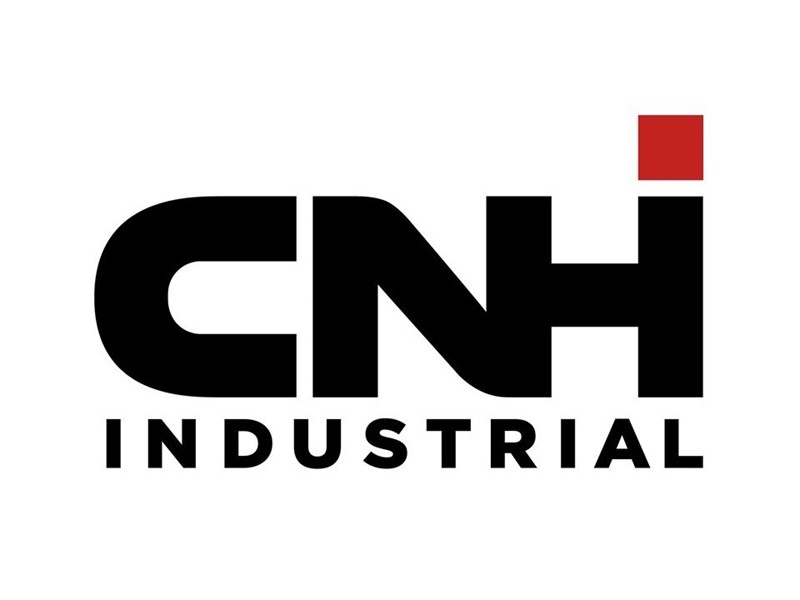2018 Pied Piper Prospect Satisfaction Index U.S. UTV Benchmarking Study
BRP’s Can-Am dealerships were the top ranked brand in the newly released 2018 Pied Piper Prospect Satisfaction Index (PSI) U.S. UTV Industry Benchmarking Study. The study measured treatment of Utility Task Vehicle (UTV) shoppers who visited a dealership, with rankings by brand determined by the Pied Piper PSI process, which ties “mystery shopping” measurement and scoring to industry sales success.
Kawasaki and Honda were ranked second and third, while Bobcat, Kubota and Textron were tied for fourth. Mahindra and Yanmar were tied for seventh, followed by Ingersoll Rand’s Club Car brand in ninth, all scoring above the UTV industry average. Other UTV brands rated in the study were Hisun, Polaris, CFMOTO, Yamaha, John Deere, MTD Products’ Cub Cadet brand, Toro, Kymco and Ariens’ Gravely brand.
For more than 10 years, the automotive and motorcycle industries have used PSI “mystery shopping” as a tool to improve the sales effectiveness of their dealer networks, turning more shoppers into buyers. From a customer’s perspective, top-scoring brands and dealerships are considered “more helpful,” resulting in greater customer loyalty. 2018 marks the first time that Pied Piper applied PSI’s fact-based approach to research and then measure the sales effectiveness of the UTV market.
The UTV market overlaps two well-established industries that previously did not compete with each other: Powersports (motorcycles, ATVs) and Outdoor Power Equipment (tractors, lawn mowers). Previously the Powersports industry focused mostly on leisure, while the Outdoor Power Equipment industry focused mostly on work. Today, for the UTV market, those boundaries are disappearing.
Differences exist today between the typical sales approach followed by Powersports dealerships and Outdoor Power Equipment dealerships. For example, Powersports dealerships are more likely to learn about customer needs, showcase vehicles through walk-arounds and accessories, and promote their dealership, but also more likely to try to steer a brand’s customers to a different brand instead. Outdoor Power Equipment dealerships are more likely to provide hands-on demonstration of vehicles, including test drives, more likely to use visual aids and provide customers with printed materials, but are less likely to get customer contact information to allow follow up.
UTV customers today face an inconsistent experience when visiting dealerships. Some dealerships are professionally run, with skilled salespeople who do all they can to be helpful, but there are also locations where UTVs are sold “on the side,” by employees primarily focused on other products.
Specific sales behaviors vary considerably from dealership to dealership, and also from brand to brand, including the following examples selected from the 60-plus PSI measurements:
- Demonstrate the vehicle.Dealers selling Honda, Kawasaki and Can-Am walked around a vehicle showcasing its features on average more than 90 percent of the time. Dealers selling Gravely, Toro and Bobcat walked around a vehicle showcasing its features on average less than 70 percent of the time.
- Test drive the vehicle.Dealers selling Yanmar, CFMoto and Kubota offered an immediate test drive on average more than 40 percent of the time. Dealers selling Polaris, Toro and Gravely offered an immediate test drive on average less than 20 percent of the time.
- Give reasons to buy – resale value.Dealers selling Club Car, Kubota and Honda mentioned high resale value as a reason to purchase on average more than 33 percent of the time. Dealers selling Toro and Polaris mentioned high resale value as a reason to purchase on average less than 10 percent of the time.
- Give reasons to buy – service convenience.Dealers selling Club Car, Kubota, Yanmar and Honda mentioned service convenience solutions (such as mobile “come-to-you” service or service pick-up and delivery) as a reason to purchase on average more than 30 percent of the time. Dealers selling Gravely, Hisun, Toro and Polaris mentioned service convenience solutions on average less than 20 percent of the time.
- Suggest going through the numbers or writing up a deal.Dealers selling Bobcat, Mahindra and Honda suggested going through the numbers or writing up a deal on average more than 50 percent of the time. Dealers selling Toro, Gravely and Yamaha suggested going through the numbers or writing up a deal on average less than 30 percent of the time.
- Mention availability of financing.Dealers selling Can-Am, Kubota, Honda and Yanmar mentioned the availability of financing options on average more than 65 percent of the time. Dealers selling Gravely, Yamaha, Toro and Kymco mentioned the availability of financing options on average less than 50 percent of the time.
- Ask for contact information.Dealers selling Bobcat, Kawasaki and Can-Am asked for the customer’s contact information on average more than 50 percent of the time. Dealers selling Cub Cadet, Kymco, Club Car and Kubota asked for the customer’s contact information on average less than 35 percent of the time
Some UTV salespeople are negative about the brand they are supposed to be selling. Some salespeople also specifically tried to steer the customer to a brand different from the customer’s preferred brand.
Not only is there variation in UTV sales behaviors, but for some brands it can be difficult for customers to find online product information or even accurate dealership location information. “It’s not always easy to be a UTV customer today,” said Fran O’Hagan, president and CEO of Pied Piper. “Because the UTV market is still young, strong dealerships with skilled salespeople are an important competitive advantage for UTV manufacturers.”
In correspondence with Outdoor Power Equipmentmagazine, O’Hagan added that, “Some of the behaviors of the OPE dealers come from their commitment to long-term relationships with their customers. They expect to sell many products to the same customer over the years, and expect to provide service work for the customer’s products. The Powersports industry has tended more toward thinking of each sale as its own transaction, regardless of customer.
“Plus, OPE dealers accept that their typical customers need their products for work; with as little downtime as possible,” O’Hagan stated. “In contrast, Powersports dealers assume that most of their customers use their products for leisure, and if a product is in the shop for days – or if dropping the product off at the dealership is inconvenient for a customer – so what.”
About Pied Piper PSI and Pied Piper Management Company, LLC
The 2018 Pied Piper Prospect Satisfaction Index U.S. UTV Industry Study was conducted between July 2017 and April 2018 using 1,168 hired anonymous “mystery shoppers” at dealerships located throughout the United States.
Complete Pied Piper PSI industry study results are provided to vehicle manufacturers and national dealer groups. Manufacturers, national dealer groups and individual dealerships also order PSI “mystery shop” evaluations – in-person, internet or telephone – as tools to improve the sales effectiveness of their dealerships. For more information about the Pied Piper Prospect Satisfaction Index, and the proprietary PSI process, visit www.piedpiperpsi.com
Founded in 2003, Pied Piper Management Company, LLC is a Monterey, Calif., company that develops and runs measurement/improvement programs to maximize the performance of retail networks. For more information, visit www.piedpipermc.com




